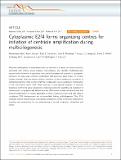| dc.contributor.author | Mori, Munemasa | |
| dc.contributor.author | Mahoney, John E. | |
| dc.contributor.author | Li, Huijun | |
| dc.contributor.author | Lu, Jining | |
| dc.contributor.author | Zhu, Xueliang | |
| dc.contributor.author | Cardoso, Wellington V. | |
| dc.contributor.author | Hazan, Renin | |
| dc.contributor.author | Miller, Emily Sun Young | |
| dc.contributor.author | Lees, Jacqueline | |
| dc.contributor.author | Danielian, Paul S. | |
| dc.date.accessioned | 2018-02-12T19:44:27Z | |
| dc.date.available | 2018-02-12T19:44:27Z | |
| dc.date.issued | 2017-08 | |
| dc.date.submitted | 2017-02 | |
| dc.identifier.issn | 2041-1723 | |
| dc.identifier.uri | http://hdl.handle.net/1721.1/113595 | |
| dc.description.abstract | Abnormal development of multiciliated cells is a hallmark of a variety of human conditions associated with chronic airway diseases, hydrocephalus and infertility. Multiciliogenesis requires both activation of a specialized transcriptional program and assembly of cytoplasmic structures for large-scale centriole amplification that generates basal bodies. It remains unclear, however, what mechanism initiates formation of these multiprotein complexes in epithelial progenitors. Here we show that this is triggered by nucleocytoplasmic translocation of the transcription factor E2f4. After inducing a transcriptional program of centriole biogenesis, E2f4 forms apical cytoplasmic organizing centres for assembly and nucleation of deuterosomes. Using genetically altered mice and E2F4 mutant proteins we demonstrate that centriole amplification is crucially dependent on these organizing centres and that, without cytoplasmic E2f4, deuterosomes are not assembled, halting multiciliogenesis. Thus, E2f4 integrates nuclear and previously unsuspected cytoplasmic events of centriole amplification, providing new perspectives for the understanding of normal ciliogenesis, ciliopathies and cancer. | en_US |
| dc.description.sponsorship | National Institutes of Health (U.S.) (Grant PO1-CA42063) | en_US |
| dc.description.sponsorship | National Cancer Institute (U.S.) (Grant PO1-CA42063) | en_US |
| dc.description.sponsorship | National Institutes of Health (U.S.) (Grant P30-CA14051) | en_US |
| dc.description.sponsorship | National Cancer Institute (U.S.) (Grant P30-CA14051) | en_US |
| dc.publisher | Nature Publishing Group | en_US |
| dc.relation.isversionof | http://dx.doi.org/10.1038/NCOMMS15857 | en_US |
| dc.rights | Creative Commons Attribution 4.0 International License | en_US |
| dc.rights.uri | https://creativecommons.org/licenses/by/4.0/ | en_US |
| dc.title | Cytoplasmic E2f4 forms organizing centres for initiation of centriole amplification during multiciliogenesis | en_US |
| dc.type | Article | en_US |
| dc.identifier.citation | Mori, Munemasa et al. “Cytoplasmic E2f4 Forms Organizing Centres for Initiation of Centriole Amplification During Multiciliogenesis.” Nature Communications 8 (July 2017): 15857 © 2017 The Author(s) | en_US |
| dc.contributor.department | Koch Institute for Integrative Cancer Research at MIT | en_US |
| dc.contributor.mitauthor | Hazan, Renin | |
| dc.contributor.mitauthor | Danielian, Paul S | |
| dc.contributor.mitauthor | Miller, Emily Sun Young | |
| dc.contributor.mitauthor | Lees, Jacqueline | |
| dc.relation.journal | Nature Communications | en_US |
| dc.eprint.version | Final published version | en_US |
| dc.type.uri | http://purl.org/eprint/type/JournalArticle | en_US |
| eprint.status | http://purl.org/eprint/status/PeerReviewed | en_US |
| dc.date.updated | 2018-02-09T14:18:08Z | |
| dspace.orderedauthors | Mori, Munemasa; Hazan, Renin; Danielian, Paul S.; Mahoney, John E.; Li, Huijun; Lu, Jining; Miller, Emily S.; Zhu, Xueliang; Lees, Jacqueline A.; Cardoso, Wellington V. | en_US |
| dspace.embargo.terms | N | en_US |
| dc.identifier.orcid | https://orcid.org/0000-0003-3623-3968 | |
| dc.identifier.orcid | https://orcid.org/0000-0001-9451-2194 | |
| mit.license | PUBLISHER_POLICY | en_US |

